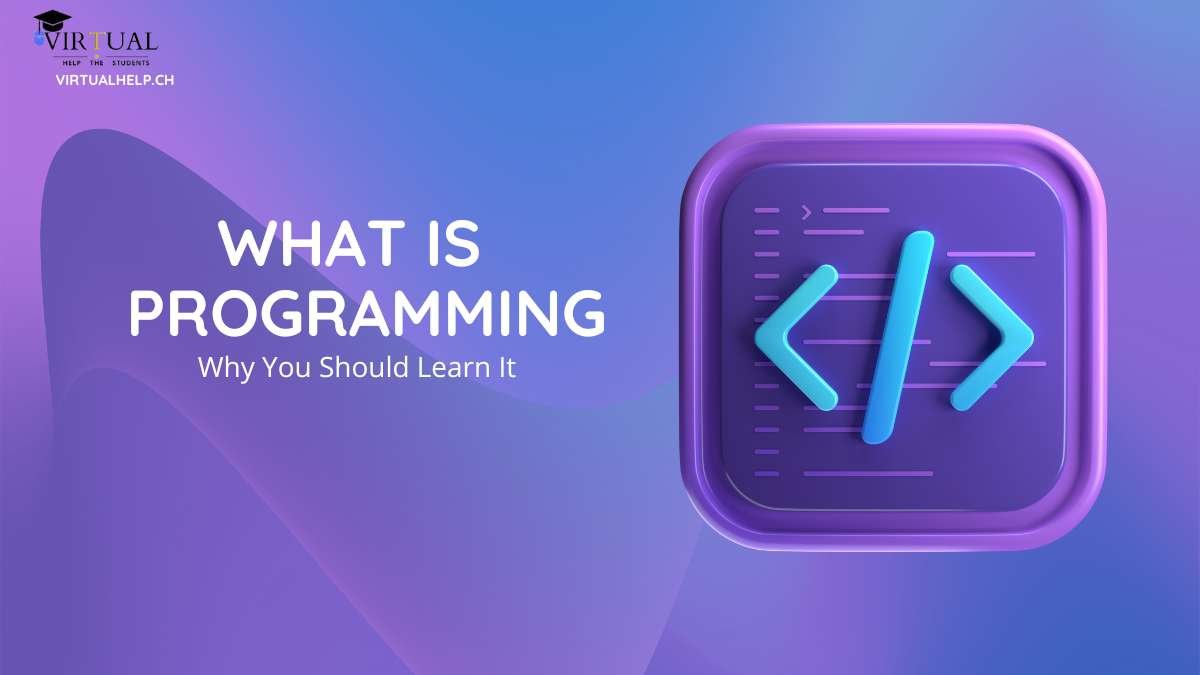In today’s tech-driven world, programming is a superpower. But what is programming and how is it different from coding? This comprehensive guide delves deep into the world of programming, exploring the core concepts and the numerous benefits of acquiring this valuable skill.
![What is Programming? [ Why You Should Learn It ] 1 image with 1280- and 760-pixels size with light pick background having title written on it what is programming](https://virtualhelp.ch/wp-content/uploads/2024/05/Purple-Professional-Course-Twitter-Ad-1024x576.jpg)
Table of Contents
ToggleWhat is Programming?
Programming is the process of giving computers clear instructions to solve problems or perform specific tasks. Imagine it as a conversation between you and the computer. You (the programmer) write code, a set of instructions using a specific programming language, that the computer (the listener) can understand and execute.
How Does Programming Work?
Here’s a simplified breakdown of how programming works:
- Writing Code: Programmers use programming languages like Python, Java, or JavaScript to write code. This code consists of letters, numbers, symbols, and special keywords that follow specific syntax rules.
- Compilation: A compiler translates the written code into a language the computer can directly understand (machine code).
- Execution: The computer executes the machine code, performing the actions outlined in the code. This could involve displaying information on a screen, calculating data, or controlling the behavior of an app.
Benefits of Learning Programming
The advantages of learning programming extend far beyond building websites or games. Here’s a glimpse into the value it offers:
- Enhanced Problem-Solving Skills: Programming teaches you to break down complex problems into smaller, logical steps. This methodical approach translates into better problem-solving abilities in all aspects of life.
- Increased Creativity and Innovation: Programming empowers you to build solutions and automate tasks. It fosters creativity as you explore different ways to achieve desired outcomes.
- Improved Communication Skills: Writing clear and concise code requires strong communication skills. Programming helps you structure your thoughts and express them logically.
- Boosted Employability: Programming skills are highly sought-after in various industries. Learning to code opens doors to exciting career opportunities in software development, data science, web development, and more.
- Financial Advantages: Programmers often command competitive salaries. As your programming skills advance, so does your potential earning power. The demand for skilled programmers is high, with some senior developers earning upwards of $400,000 annually
- Personal Development: Learning to code fosters a sense of accomplishment and boosts your confidence as you master new skills and build projects from scratch.
- Join the Tech Giants: Unlock opportunities to work at leading tech companies like Google, Amazon, Microsoft, and Facebook.
Popular Programming Languages
The programming language you choose depends on your specific goals. Here’s a look at some of the most widely used languages:
| Programming Language | Applications |
|---|---|
| JavaScript | Web development, mobile app development, game development |
| Python | Data science, machine learning, web development, scripting |
| Java | Enterprise software development, Android app development, web applications |
| C++ | System programming, game development, high-performance computing |
| HTML/CSS | Web development (front-end) |
How to Start Learning Programming
Ready to embark on your coding journey? Here are some steps to guide you:
- Identify Your Goals:
- Do you want to build websites, analyze data, or create mobile apps? Understanding your goals helps you choose the right language and learning path.
- Take an Introductory Course:
- Numerous online and offline courses provide a foundation in programming concepts and specific languages.
- Practice and Build Projects:
- The best way to solidify your learning is by doing. Find beginner-friendly tutorials to build projects that interest you. This hands-on experience is crucial for mastering coding skills.
- Connect with the Programming Community:
- Joining online forums, attending meetups, or following coding influencers can provide valuable support, insights, and opportunities to learn from others.
One-on-One Learning
This is one of the best methods for learning because in this approach, the teacher directly focuses on you and gives his 100 percent to teach you, unlike in a traditional setting where he has 30 or 40 students to teach. In this mode of studying, you can adjust your study timing according to your free time by discussing it with your teachers. VirtualHelp.ch provides you this opportunity of one-to-one learning. So, contact us to start your learning journey with us
Virtual Help
More than just Tutoring- Free Demo Session
- Flexible Study Schedule Set by the Students
- One-on-One Interaction with the Teachers
- 100+ Students already Studying
The “Coder” vs. “Programmer” Debate
Some developers distinguish between coders and programmers. Coders might primarily use HTML and CSS for website structure, while programmers leverage languages like JavaScript for complex functionalities. However, the lines can blur, and the terms are often used interchangeably.
Follow Us on LinkedIn
FAQ
What is programming?
Programming is the process of giving clear instructions to a computer to solve problems or perform specific tasks using code written in a programming language.
How is programming different from coding?
Programming involves planning and solving problems with code, while coding is the act of writing the code itself according to specific syntax and rules.
What are the benefits of learning programming?
Learning programming enhances problem-solving skills, increases creativity, improves communication, boosts employability, offers financial advantages, and promotes personal development.
Which programming languages are most popular and what are they used for?
Some popular languages include JavaScript: Web development, mobile app development, game development.
Python: Data science, machine learning, web development, scripting.
Java: Enterprise software development, Android app development, web applications.
C++: System programming, game development, high-performance computing.
HTML/CSS: Web development (front-end).
How do I start learning programming?
Start by identifying your goals, such as building websites, analyzing data, or creating apps. Then, take introductory courses, practice by building projects, and connect with the programming community. For One-on-One Learning, which is best method for learning, Visit virtualhelp.ch
What is dynamic programming?
Dynamic programming is a method of solving complex problems by breaking them down into simpler overlapping subproblems and storing the results of these subproblems to avoid redundant computations.
What is functional programming?
Functional programming is a programming paradigm that emphasizes the use of functions and avoids changing state or mutable data. It focuses on the use of pure functions to produce predictable and reliable results.
What is reactive programming?
Reactive programming is a paradigm focused on data flows and the propagation of change. It emphasizes handling asynchronous data streams and reacting to changes in data over time.
What is a pipeline in programming?
In programming, a pipeline is a series of processes or stages through which data flows and is transformed. It is used to process data efficiently in a sequence of tasks.
What is object-oriented programming?
Object-oriented programming (OOP) is a paradigm based on organizing code into objects, which contain data and methods. It emphasizes encapsulation, inheritance, and polymorphism to design modular and reusable code.
What is a framework in programming?
A framework in programming is a pre-built set of tools, libraries, and guidelines that provides a structure for developing applications. It helps streamline development and enforce coding standards.
Which of the following is a popular and versatile programming environment for building data pipelines?
Python is a popular and versatile programming environment for building data pipelines, thanks to its rich ecosystem of libraries such as Pandas, NumPy, and more.
How many cores for programming?
The number of cores needed for programming depends on the complexity of your projects and the tasks you’re working on. Multiple cores can improve performance for tasks like compiling code, running simulations, and data processing. Generally, having at least four cores is recommended for a smooth programming experience.







